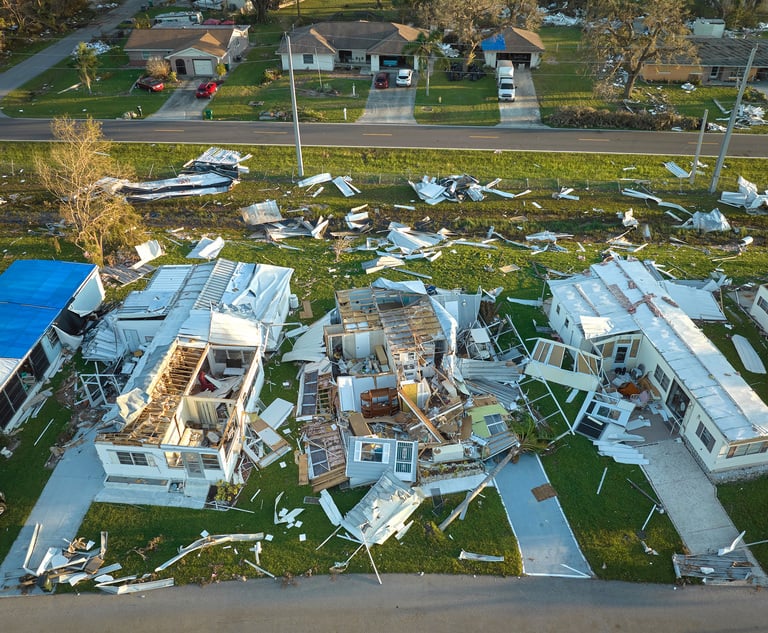 With the volatile economy andunemployment on the rise, companies continue to scale back the workforce or may expect employees totake on added responsibility and projects. This means that manyworkers often have even less time to complete more duties thatextend past their original work scope. The insurance industry is noexception, and we continue to see companies looking towardsstreamlining and centralizing processes. As it relates toadditional living expenses (ALE), there are many temporary housingcompanies that specialize in partnering with the insurance industryto reduce the workload by simplifying the process, as well asreduce costs by increasing efficiency.
With the volatile economy andunemployment on the rise, companies continue to scale back the workforce or may expect employees totake on added responsibility and projects. This means that manyworkers often have even less time to complete more duties thatextend past their original work scope. The insurance industry is noexception, and we continue to see companies looking towardsstreamlining and centralizing processes. As it relates toadditional living expenses (ALE), there are many temporary housingcompanies that specialize in partnering with the insurance industryto reduce the workload by simplifying the process, as well asreduce costs by increasing efficiency.
Professional Handholding
|We all know that client satisfaction is always a provider's number one goal. Itis important to make sure that the companies you partner with haveexperience and a broad knowledge in working with insurancecarriers. It is equally as important to make sure they haveadequate staffing. These companies will need to be available forimmediate solutions. Choose a company that is well-staffed withemployees who know how to deal with the emotional needs ofpolicyholders who have just experienced a traumatic event. Theideal company consists of trained professionals capable of beingthere every step of the way to ease the policyholder's transitionfrom hotel, to temporary housing, to going home.
||Working with policyholders takes a great deal of skill andhandholding. These policyholders are displaced from their homesbecause of myriad reasons and have differing emotions to which youmust cater. Voicemail is not the best solution in criticalsituations and should always be avoided whenever possible. It isalso crucial that incoming phones calls are answered timely and bya “live” representative from that company offering assistance toyour policyholder. The first impression is everything. Whether thecall originates from an adjuster or a policyholder, it must beanswered promptly and with a solution to the problem at-hand. Makesure your partnering insurance housing company is there for you andyour insured when you need them the most. Before selecting ahousing company, ask for details about what information system(s)it has in place–such as intranet, online portals, and external andinternal phone systems.
|Easing the Burden
|One benefit of working with more than one temporary housing ALEprovider is that more housing providers are customizing programs torelieve some of the burden placed on the adjuster. When workingwith these companies, you should determine which practices workbest for you and your policyholders. Then stipulate that thoseprocesses be put in place by your current providers or make achange to a provider that can supply you with the services youseek. These insurance housing companies streamline the housingprocess for the adjusters by providing complete housing managementfor each claim. The “business” area of criteria is essential to theoverall success of your housing company choice and how thetemporary housing company will contribute to your productivity andcost savings.
||This is achieved by offering end-to-end support for yourcompany's needs, thus enabling improved efficiency, reduced timespent on claims, and decreased costs within the temporary lodgingprocess while serving the needs of your policyholders. Some of theservices offered by temporary housing partners include:
- Around-the-clock (24/7) hotel management.
- Locate comparable properties that meet adjusters criteria basedon location, length of stay, budget, and policyholders' needs.
- Provide quotes and get approval from adjusters.
- Manage all move-in details including leases, furniture andhouseware deliveries, and coordinate utilities.
- Manage payment to all vendors throughout lease while providingclear and concise invoicing.
- Ongoing communications with policyholder and adjuster asneeded, including discussions regarding extensions and notices tovacate.
- Provide monthly management reports so that a carrier cananalyze their ALE spending.
- Coordinate move-outs by arranging furniture pick-ups, noticesto landlords, cancel any services that were originally orders, andreconcile security deposits.
Hotel placements will be the first steps in relieving you ofadministrative duties which will allow you to concentrate on theissues of the claim. You will find it to be an advantage if yourprovider is available 24/7 for immediate assistance in locatinghotels for policyholders. Temporary housing companies can negotiatenational and local rates to ensure best pricing practices. It isimportant to watch for when working with insurance housingcompanies is how they charge for their hotel placements. Somecompanies will charge by only passing along the allowable expenseswith no additional fees for this service, while others may becharging a service fee or percentage of cost. Another benefit toALE management is that the provider should manage all approvedpayment and reconciliation of all invoices associated with thehotel stay.
|Many clients will need to move on to long-term temporaryhousing. A company that will have a true national footprint as itrelates to locating comparable properties is essential. Theseproperties must meet the adjusters criteria based on location,length of stay, budget, and any and all policyholders needs. Duringthis process best practices will be that you are provided withquotes for your approval. This turn-key process should manage allmove-in and move-out details including leases, furniture,housewares, utilities and security deposits. Ongoing communication to both the adjuster and policyholderthat include discussions regarding extensions and notices to vacateare imperative to cost containment.
||Total Transparency
|More and more adjusters are asking for a detailed breakdown ofcosts associated with each claim. This will eliminate the timespent trying to guess what the cost of each line item should be asit relates to hotels and temporary housing costs. Another bestpractice that temporary housing companies should be doing is“truly” making available to insurance companies a totaltransparency of costs–which is to say a detailed accounting of eachcost. This simplifies the Additional Living Expense process whileallowing insurance companies a clear vision in to what they arepaying for. Cost transparency takes the guesswork out of costsassociated with ALE. When working with a housing provider it isimportant to ask if they will show all payments made on theinsured's behalf by providing copies of hotel bills for eachplacement incurred at the time of invoicing. They also shouldprovide a breakdown of costs (rent, furniture, housewares,management fee, etc) for each claim so that you may easily approvecharges. Working with a housing company that offers detailedaccounting or “transparency of costs” will make it easier for theadjuster to approve only allowable expenses.
|Technology Internally and Externally
|In the world of technology more and more carriers andpolicyholders expect instant access to information. Not only mustthe access be immediate but it must also be a complete snapshot ofthe file in question. Most companies today provide several avenuesto access information which may include; telephone, email, oron-line communication. Temporary housing companies are no exceptionas it relates to providing up to date “live” information throughone of these modes. The information needed for ALE is massive andsometimes complex. To help streamline processes and access dataquickly many providers offer on-line access to data.
|This online platform is the key to relieve some of theadministrative tasks from the adjusters and allow them more time tofocus on each claim while offering them the ability to manage theminute detail of each claim.
||Claims ALE Training
|Keeping well informed of the real estate market and its pitfallswill help keep the adjuster ahead of the competition. You need tobe able to trust a temporary housing company that knows the marketand provides training programs to assist you in making educateddecisions which improve your services to the policyholder. Thesetraining programs may be conducted in person or via the web. Theycan also be tailored to help the adjusters make better choices inmanaging costs by showing case studies on which would be the besthousing option such as a hotel or furnished apartment; a singlefamily home or a townhouse.
|These training programs should not only provide the tools andknowledge which adjusters need but also be able to better controlcosts. This also better informs the adjuster of the expectationsset for the temporary housing process. This knowledge expands yoursuccess in offering better service to your policyholders.
|It is difficult to keep up with the growing demands withoutreaching out for some needed assistance. Evaluate yourexpectations; decide what is needed to expand your success incustomer care, ease of business, communication and transparency ofcost. Choose an insurance housing company that will be a respectedextension of you and your corporation. By providing you the abilityto concentrate on the policyholder, and not the administrativedetails that tend to overshadow the presence of success, willcertainly make you come out on top regarding service, workload, andretaining your clientele.
|
Want to continue reading?
Become a Free PropertyCasualty360 Digital Reader
Your access to unlimited PropertyCasualty360 content isn’t changing.
Once you are an ALM digital member, you’ll receive:
- All PropertyCasualty360.com news coverage, best practices, and in-depth analysis.
- Educational webcasts, resources from industry leaders, and informative newsletters.
- Other award-winning websites including BenefitsPRO.com and ThinkAdvisor.com.
Already have an account? Sign In
© 2024 ALM Global, LLC, All Rights Reserved. Request academic re-use from www.copyright.com. All other uses, submit a request to [email protected]. For more information visit Asset & Logo Licensing.








